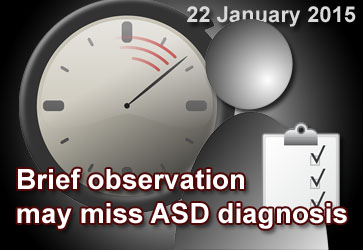Check out other stories from the Latest News
Brief Observations Unreliable for ASD Diagnosis
By Chelsea E. Toledo, M.A. on January 22, 2015

Background: Although studies have identified differences in children with autism spectrum disorder (ASD) appearing as early as infancy, the behavior of very young children with ASD could match that of typically developing counterparts at times. With age, atypical behaviors appear with increasing frequency in children with ASD. This pattern is potentially problematic for families seeking early diagnosis, as the behavioral observations considered in clinicians’evaluations of children are usually quite brief.
What’s new: The February 2015 issue of Pediatrics included a study exploring the efficacy of brief behavioral observations for identifying children with ASD. The researchers conducted evaluations for a total of 44 children between the ages of 15 and 33 months, administering multiple questionnaires and observations to assign them to one of three groups: ASD, language delay, and typical development. Two psychologists specializing in early childhood development then watched 10- to 30- minute videos of the children to make their own evaluations. The researchers found that the experts were unable to catch 39 percent of the ASD cases from the brief observations alone, as the children with ASD demonstrated typical behavior 89 percent of the time.
Why it’s important: This is the first study to measure the extent to which young children with ASD can exhibit typical behavior. It suggests that any atypical behaviors appearing in observations merit follow-up and additional screening.
Help me understand :
| Source(s) : |
| Tweet |

